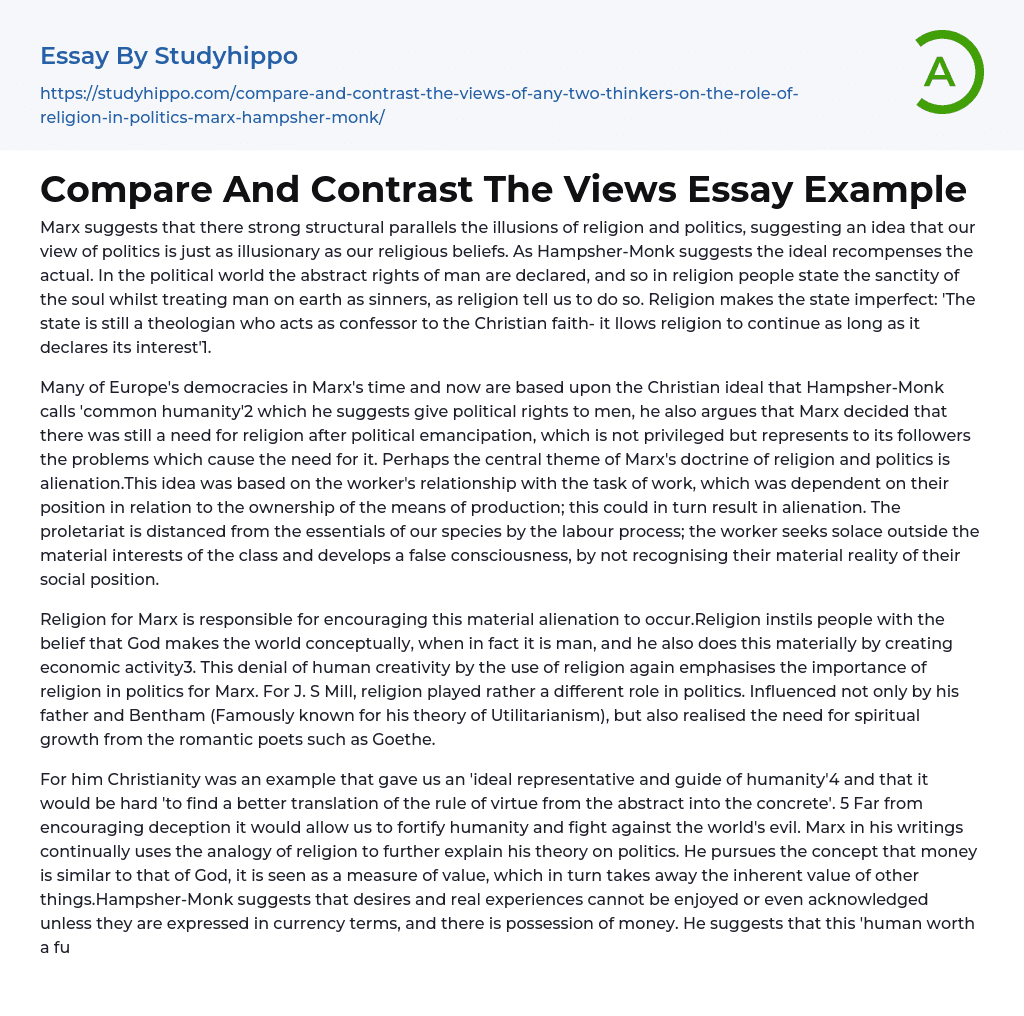According to Marx, there are significant structural similarities between the illusions of politics and religion. This notion proposes that our perception of politics is just as illusory as our religious beliefs. Hampsher-Monk claims that the ideal compensates for reality. In the political realm, abstract human rights are declared, much like how religion emphasizes the sanctity of the soul but treats humans on earth as sinners. This leads to imperfection in the state, with religion acting as a confessor for Christian faith while the state allows its continuation as long as it aligns with its interests. 1
Hampsher-Monk states that many of Europe's democracies, both in Marx's era and today, are founded on the Christian philosophy of 'common humanity', which provides political rights to men as noted by Marx. Despite achieving political emancipation, Marx believed religion w
...as still necessary. While religion may not be privileged, it represents to its followers the issues that require it. The idea of alienation is central to Marx's views on religion and politics. According to him, a worker's relationship with their job is determined by their relative position to the means of production, which can result in alienation. Workers are separated from essential aspects of being human through their labor and seek comfort beyond their class interests by developing a false consciousness that does not acknowledge their true social standing.
Marx believes that religion is responsible for promoting material alienation. It teaches people that God is the creator of the world, but in reality, it is man who creates it both conceptually and materially through economic activity. This denial of human creativity is a driving force behind the significance of religion i
politics according to Marx. In contrast, for J.S. Mill, religion played a different role in politics. His beliefs were influenced not only by his father and Bentham's utilitarianism but also by the importance of spiritual growth highlighted by romantic poets such as Goethe.
According to Marx, Christianity serves as an example for an ideal representative and guide of humanity, providing a translation of the rule of virtue from the abstract to the concrete. This provides fortification against evil in the world, rather than encouraging deception. Marx uses religious analogy in explaining his political theory, equating money with God due to its measurement of value and devaluation of other things. Hampsher-Monk argues that the value placed on possessions mirrors the concept of human worth in religion, where respect is based on the properties of one's God.
The concept that only God can provide salvation is similar to the economic necessity of money for survival. Karl Marx argued that the elimination of religion, which he considered a false source of happiness, was crucial for achieving genuine happiness. According to Marx, people would not find fulfillment by simply renouncing religious practices, but by abandoning them, they could confront the root cause of their estrangement. This idea was also reaffirmed later in communism.
It can be concluded from Marx's writings that by eliminating the division of labor, religion will no longer be necessary and should be viewed as a placebo rather than a solution. Religion's emphasis on submission benefits both the bourgeoisie and the proletariat by serving as a class ideology that perpetuates the existing societal structure.
According to Mill's view, religion has the potential to bring about progress even beyond a
person's lifetime and extend throughout human existence. In contrast, Marx often refers to the role of religion in politics using the Prussian state as an example, even though it was not a Christian-based state and instead supported a type of Protestantism. Marx disagreed with Bruno Bauer's belief that discarding all religion would result in political freedom, pointing out that other states, like those in North America, coexisted with religion. Mill believed that providing an ideal to satisfy people's yearning for greatness is possible, while Marx saw the importance of religion in politics through examples such as the Prussian state and North America.
Ling highlights a potential darker motive behind the state's use of religion, which involves promoting questionable religious ideas as absolute truth. Marx believed that this political tactic was of utmost importance as it compelled the state to mandate religious worship. The Prussian state bureaucracy pushed for Protestant doctrine to shield itself from criticism. The bureaucratic members recognized the usefulness of theological concepts in justifying contemporary economic inequalities. Mill brings up religion again in his discussion of ethical theory 'Utilitarianism.' He argues that religion has an impact on society and can lead to external motivations that promote happiness. One such motivation is the fear of displeasing God or the hope of pleasing Him.
Experiencing religious emotions generates a sense of obligation within individuals, motivating them towards happiness. This responsibility results in feelings of regret when actions go against the principles that promote happiness.
- Puritans essays
- Afterlife essays
- Buddhism essays
- Christianity essays
- Deism essays
- Faith essays
- God essays
- Hinduism essays
- Islam essays
- Jews essays
- Judaism essays
- Monotheism essays
- New Testament essays
- Ritual essays
- Sin essays
- Soul essays
- Theology essays
- Confession essays
- Devil essays
- Miracle essays
- Monk essays
- Revelation essays
- Atheism essays
- Immortality essays
- Jainism essays
- Sinners essays
- Bible essays
- Old Testament essays
- Salvation essays
- Temple essays
- Taoism essays
- Pilgrimage essays
- Freedom Of Religion essays
- Existence of God essays
- Christian Worldview essays
- Cosmological Argument essays
- Gautama Buddha essays
- Karma essays
- Buddha essays
- Baptism essays
- Holy Spirit essays
- Jesus Christ essays
- Adam And Eve essays
- Crucifixion Of Jesus essays
- Crusades essays
- Eucharist essays
- God The Father essays
- Pope essays
- Protestantism essays
- Christian essays




